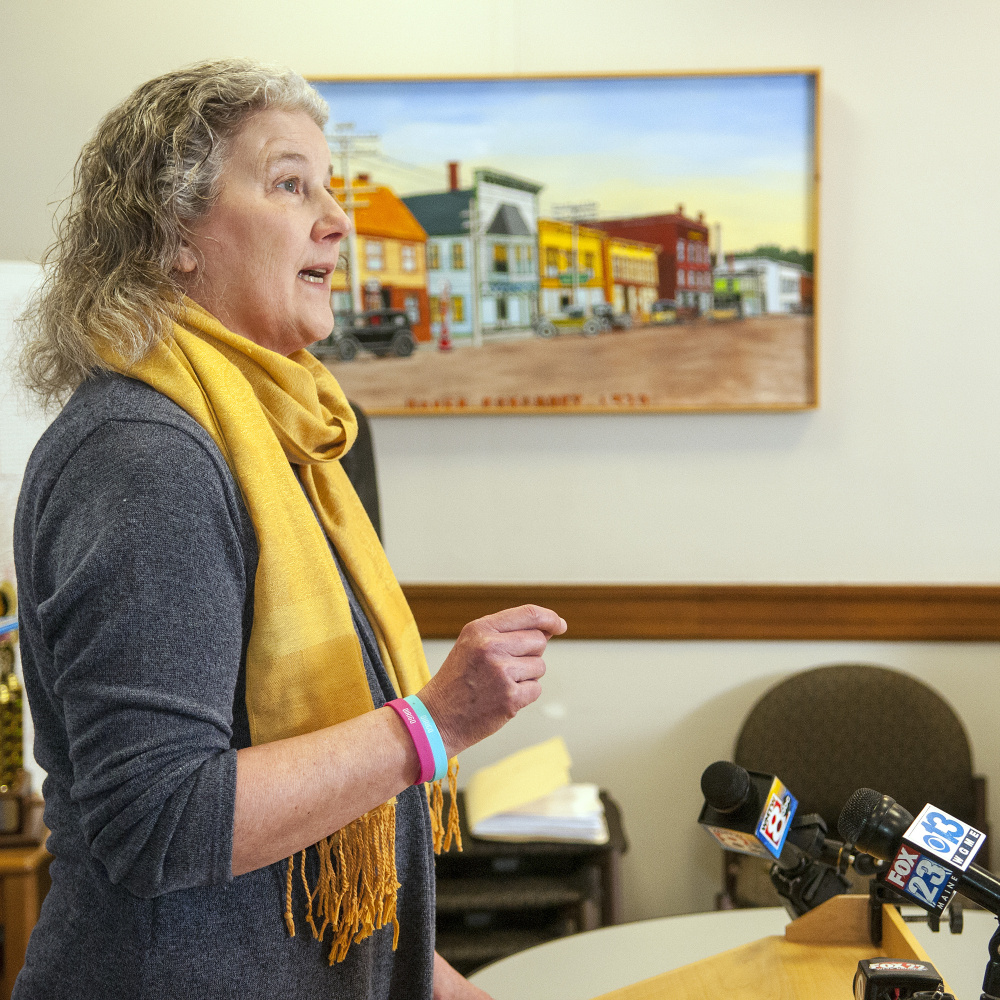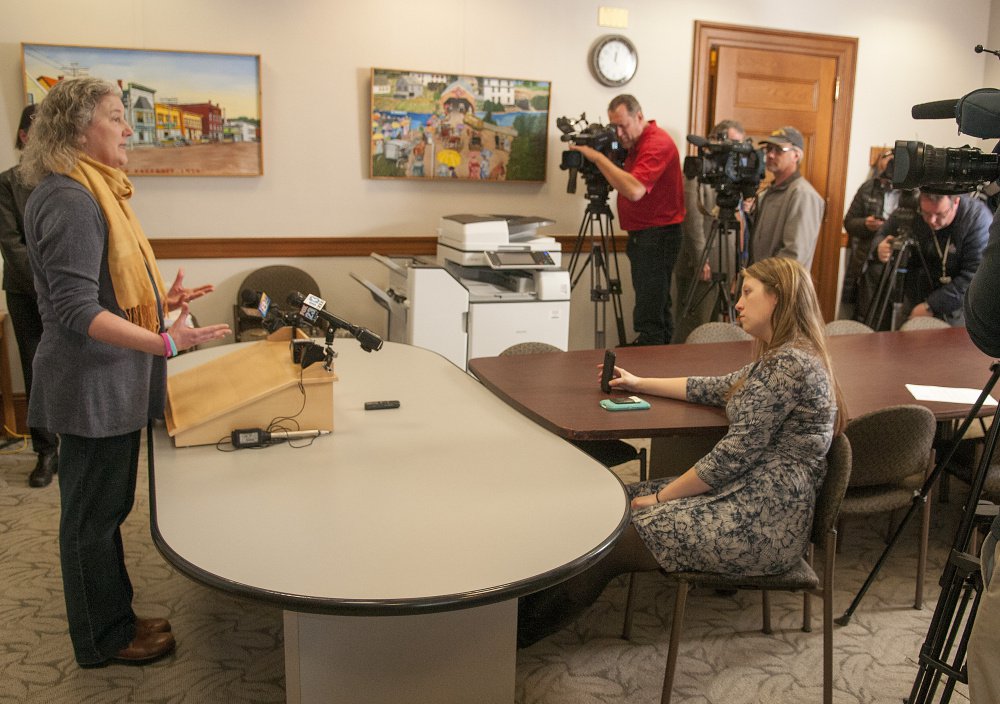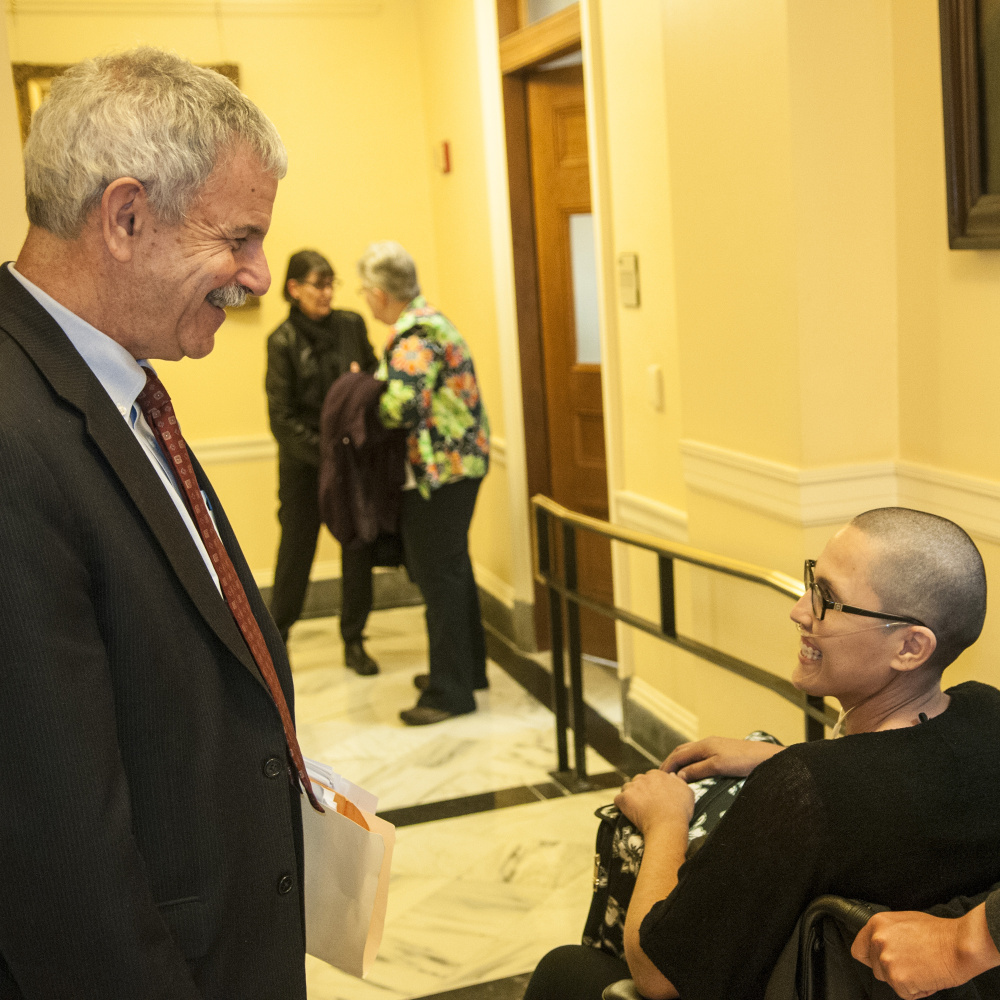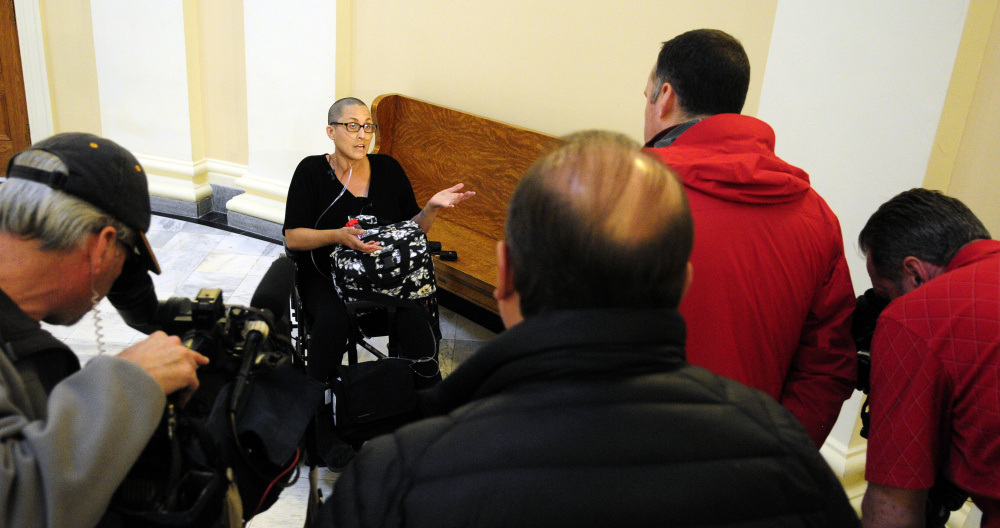Eva Thompson has had good days since she was diagnosed with stage 4 colon cancer in the fall of 2013 — and she’s had bad ones.
Both of her children have been married in that time, and she’s taken several trips to Ireland with her husband. She’s an ordained interfaith community minister and, when possible, likes to deliver Sunday sermons. After her diagnosis, and the initial rounds of surgery and chemotherapy, she even went seven months without evidence of the disease.
But the cancer did return and has metastasized to Thompson’s other organs. She’s still receiving chemotherapy, but she worries about the side effects and the dwindling number of treatment options available for the advanced disease.
“Once the cancer came back in 2015, the trajectory was set,” said Thompson, 57, of Camden. “It’s just a matter of how much time you have left. I would say 2017 is likely to be my last year.”
Thompson wants to live as long as possible, she said during an interview this week; but given that she could face a slow, painful death from her disease, she’s supporting L.D. 347, a bill in the Legislature that would allow dying patients to be prescribed lethal drugs.
The legislation, sponsored by Sen. Roger Katz, R-Augusta, and announced in a news conference Tuesday at the State House, is similar to a law passed by Vermont in 2013. It’s also similar to a bill that was rejected narrowly by the Maine Legislature in 2015.
Under the proposal, patients who are ill and deemed by their doctors to be within six months of death could request medication that would hasten their deaths. They would be required to make two separate spoken requests for the medication, at least 15 days apart, and to sign a written request, among other steps. Two disinterested witnesses also would have to sign that request, vouching that the patient understands it and does not appear to be under duress or undue influence.
Physicians and pharmacists would not be required to grant those requests, according to the bill, and physicians are not allowed to end a patient’s life by lethal injection or other means.
“The premise of the law is simple: that a competent adult ought to have control of his or her life, generally free of government interference,” Katz said in an interview. “It’s a libertarian ideal that we honor in Maine in many ways. People have the right to make medical decisions for themselves and also have the right to refuse treatment.”
Two years ago, Katz’ death with dignity bill was defeated by the Senate in an 18-17 vote. It was opposed by various religious and medical groups, including the Maine Medical Association, which represents physicians and argued that helping someone die runs counter to a doctor’s code of ethics. Maine voters also rejected a right-to-die proposal during a referendum vote in 2000.
But several other states have passed so-called “death with dignity” laws, including Oregon in 1997 and more recently Vermont, California, Colorado and Washington. Katz said he is reintroducing the legislation this year because he’s been encouraged by those other states.
“The biggest reason for optimism is we have two more years of experience of the bill being in place in other states, Oregon and Vermont,” Katz said. “It’s two more years of the law working well, of some people’s end of life being easier than it would be otherwise. That’s the major difference. And it only lost by a vote (in Maine) last time. It was close.”
In the 20 years that Oregon’s law has been on the books, 1,749 patients have been prescribed lethal medications through the law, and 1,127 — 64 percent — used them to die, according to state data. Last year, Oregon doctors prescribed 206 lethal medications, 133 of which were reported to have been used by patients.
Katz mentioned that statistic to show that not all patients who avail themselves of the drugs end up using them. He said there have been studies that show doctors in right-to-die states have not prescribed the medications wrongly to patients who aren’t eligible. He also said that there are safeguards in the law to ensure that health care providers aren’t required to participate.
Thompson, the Camden cancer patient, also spoke at the news conference announcing Katz’ bill Tuesday. In an interview Monday, she said she’s not in a hurry to take the lethal drugs, but that having them would still give her comfort as her condition deteriorates.
“I’ve known right from the time I was diagnosed, I don’t want to go to the end (experiencing) great suffering and misery and loss of independence and quality of life,” Thompson said. “I don’t want to have to spend time worrying about how the end will go and how much pain I will be in. I have limited time; having the drug on hand would be very reassuring, and once I had the drug, I could stop thinking about it.”
A public hearing about the death-with-dignity bill is scheduled for 9:30 a.m. Wednesday before the Legislature’s Health and Human Services Committee, and Katz said he expects several patients like Thompson to testify in support. Another death-with-dignity bill, sponsored by Rep. Jennifer Parker, D-South Berwick, also is due for a hearing Wednesday.
At least one lawmaker, Sen. Paul Davis, R-Sangerville, already has announced his opposition to the latest iterations of the proposal. At his own news conference Tuesday, Davis was joined by Stephanie Packer, a California woman who has become an outspoken opponent of death-with-dignity laws. Packer has scleroderma, a debilitating disease that affects her lungs and that doctors have said she will die from.
On Tuesday, Packer said that her health insurance provider denied her coverage for a medical treatment after California passed its own death-with-dignity law in 2015, but also offered to cover a prescription of lethal medication under the new law. She warned that a Maine law allowing doctors to prescribe lethal drugs could undermine hospice and palliative care efforts, particularly for the poor.
The Roman Catholic Diocese of Portland has been a consistent opponent of death-with-dignity legislation, but a spokesman for the diocese did not respond immediately Tuesday to a request for comment.
In 2015, Suzanne Lafreniere, director of the office of public policy for the diocese, told lawmakers that a person’s life must be protected “at every stage and in every condition. … A law permitting assisted suicide would demean the lives of vulnerable patients and expose them to exploitation by those who feel they are better off dead,” she said in her written testimony.
The Maine Medical Association, which represents the state’s physicians in the Legislature, opposed the death-with-dignity bill in 2015 and the referendum in 2000.
The organization’s board will meet later this month to take a position on L.D. 347 and Parker’s bill, L.D. 1066, said Gordon Smith, the group’s executive vice president.
The association is surveying members about whether the group should continue to oppose physician-assisted suicide, and there has been a 50-50 split between respondents who think the organization should and shouldn’t continue to hold that position, Smith said.
“That always gives an association pause to say, ‘Well, gee,'” Smith said of the 50-50 split. “It’s one more piece of information.”
Even if the association ultimately does not take a formal position on the bills, Smith said that it will work to ensure they include protections for doctors.
Charles Eichacker — 621-5642
Twitter: @ceichacker
Send questions/comments to the editors.








Comments are no longer available on this story